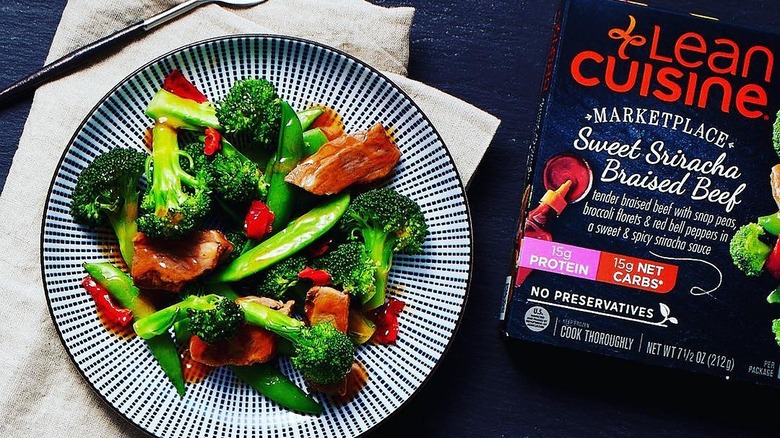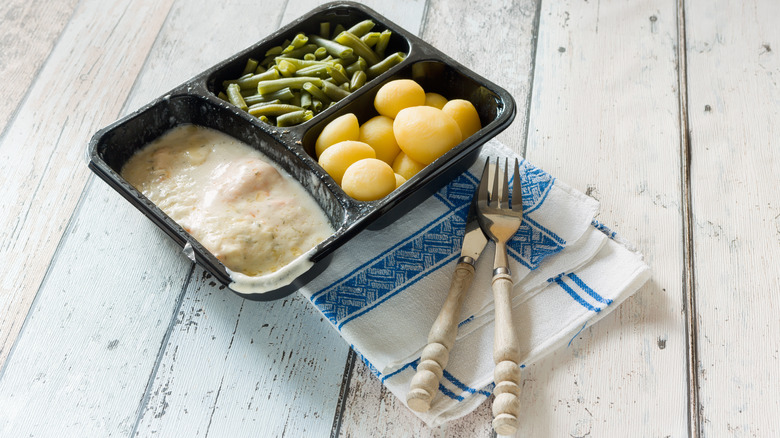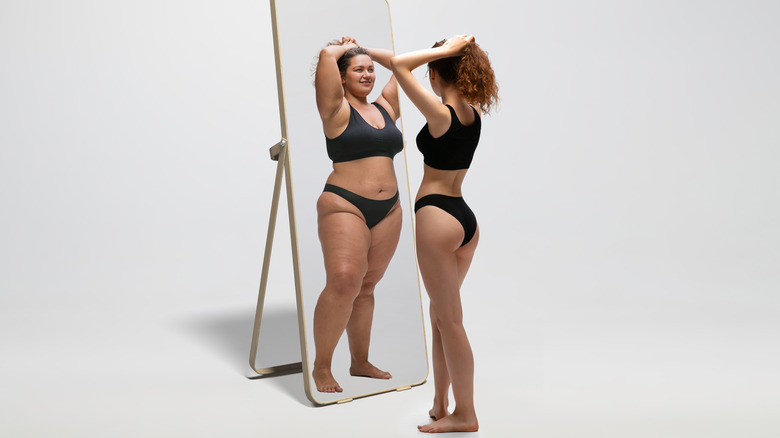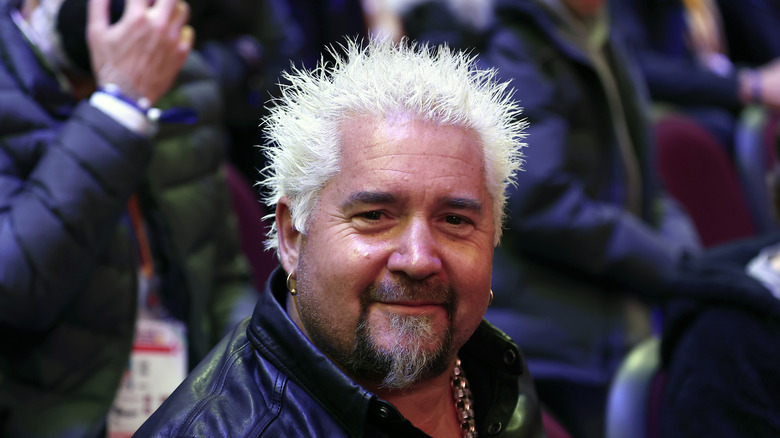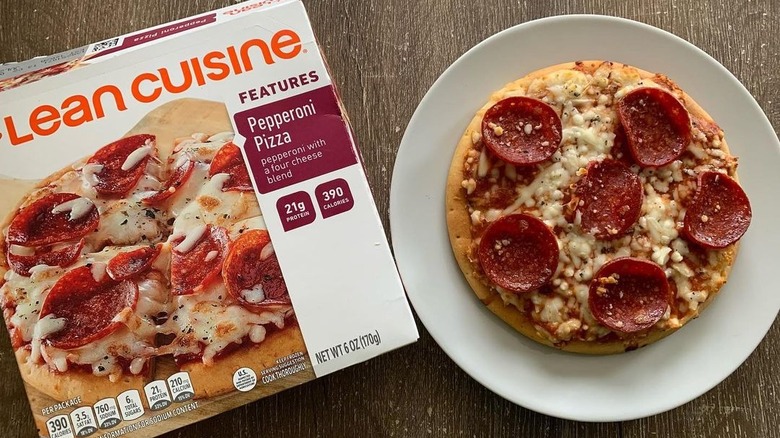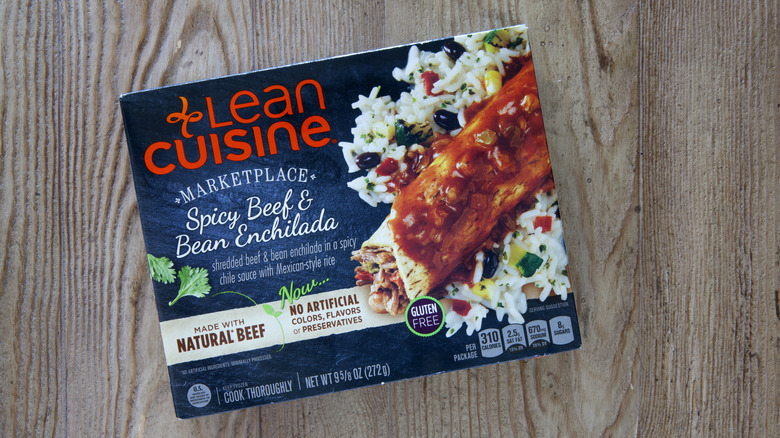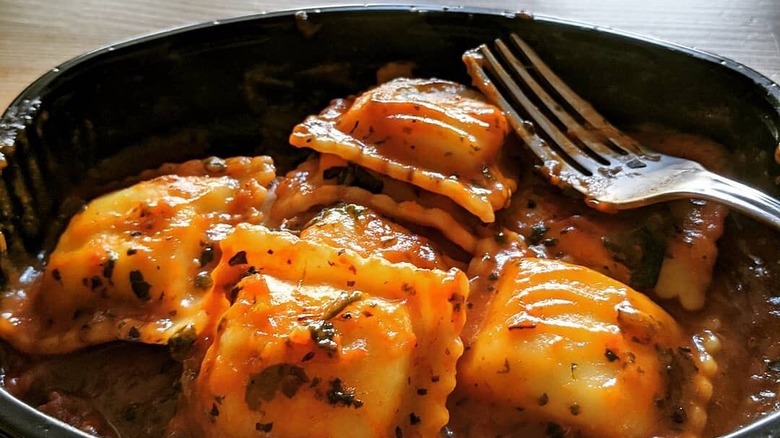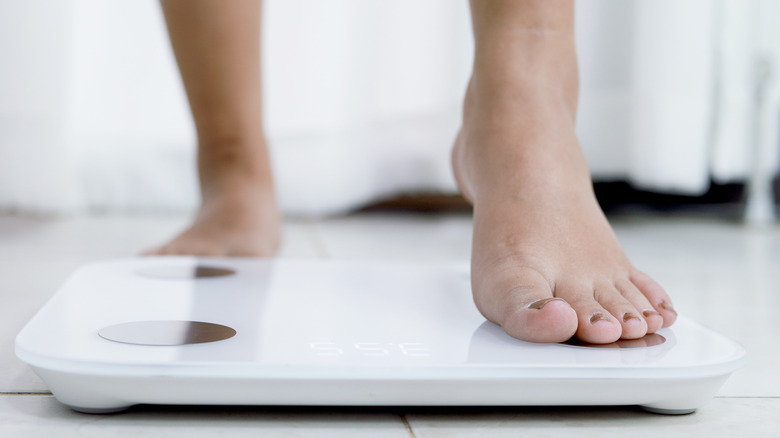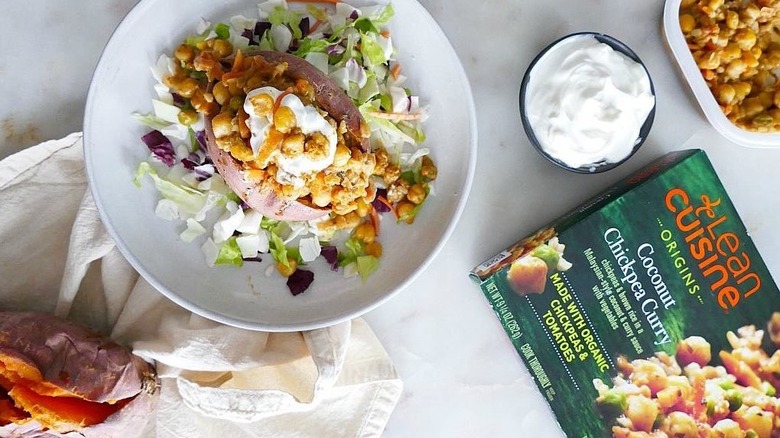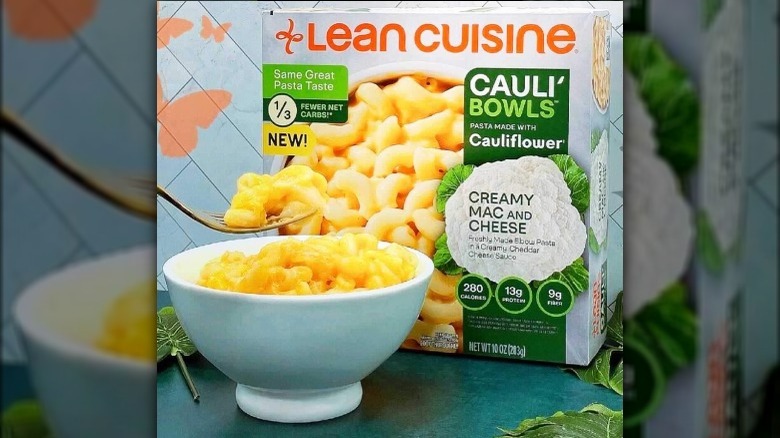The Untold Truth Of Lean Cuisine
When it comes to quick-and-easy better-for-you meal options, Lean Cuisine set the bar back in the '80s. Originally owned by Stouffer's, the brand quickly framed itself as an easier, healthier choice that promised career-driven go-getters (mainly women, as ads from the past clearly show) they could have it all: a career, slim silhouette, and delicious meal ... all without being a slave to the stove.
In recent years, Lean Cuisine has had to majorly revamp its image, according to Vox, in order to respond not only to the death of diet culture nationwide but also to questions regarding the product's supposed healthiness. Specifically, Livestrong notes, there are reasonable concerns to indicate that these frozen entrees just don't offer enough food to be considered an adult meal.
From auspicious beginnings to modern critiques, and cringey ads to awkward modern Vines, here's everything you didn't realize you needed to know about Lean Cuisine.
The company was launched by Stouffer's in the '80s
Lean Cuisine was first launched by Stouffer's in 1981, though it was far from the brand's first foray into frozen dinners, according to Ohio History Connection. Stouffer's actually got its start as a restaurant before launching frozen meals post-World War II due to consumer demand. In the '50s, the family began preparing and freezing dinners at a small processing plant, standing out from other companies due to its high quality.
As for Lean Cuisine, according to The New York Times, the brand's name was the brainchild of adman George Lois, who also created the "I Want My MTV" campaign, over 40 covers of Esquire, and countless other advertising projects. His innovation-focused marketing strategies helped propel both computers and Lean Cuisine into the future, with LoveFood noting that the original dinners were so popular, supermarkets would frequently sell out. The product's goal, if ads from the time are any indication, was twofold: to provide a balanced solution to weight loss that didn't make consumers (chiefly women) feel deprived.
Its marketing strategy has long hinged on the promise that women can have it all
While there's nothing innately gendered about Lean Cuisine's product or packaging, from the very beginning, the brand's communication has chiefly centered on the assumption that its predominantly female customers want it all: A happy, successful life, a delicious dinner, and a svelte silhouette. Early commercials from the 1980s leaned heavily on the slogan "More Satisfaction", showing montages of women achieving career aspirations and attracting the male gaze as they walk along the beach or city streets. The cheerful female voice singing the jingle celebrates Lean Cuisine bestowing upon her and her fellow females "a way to eat right, eat light, more satisfaction."
But in recent years, Lean Cuisine has received major blowback from women no longer interested in having it all, specifically because, as The Washington Post reports, they don't want to be the only targets for such a weight loss focused brand or marketing strategy. "This could have been in general, 'How can Americans, how can humans have it all?'" Angeline Close Scheinbaum, an advertising professor at the University of Texas, told the outlet with regards to a recent Lean Cuisine campaign singing the same old tune.
The microwave meals were featured in a popular Vine alongside Guy Fieri
With his steadfast love of burgers and wings, Food Network star Guy Fieri hardly seems like the most appropriate Lean Cuisine spokesperson. But back in 2015, that's exactly what he became with one of the oddest — and most prominent — modern appearances of the brand in popular culture. Fieri appeared in a viral Vine, autographing Lean Cuisines and tossing them into a cheering crowd, Eater reports.
With a soundtrack to Fifth Harmony's "Worth It" in the background (and an original caption, according to Chew Boom, of "making dreams come true,") it was, according to E!, "the most Millennial thing you'll see all day." It certainly got plenty of views, and First We Feast posted on Twitter that "Guy Fieri giving out free Lean Cuisine is more lit than any rap video of 2015." Frankly, we're not sure whose reputation suffered more by association.
Lean Cuisine is facing a reckoning with modern ideas of wellness
Lean Cuisine rose to fame in the '80s and '90s, a period dominated by diet culture, according to Image. Supermarket aisles were filled with products promising to help shed pounds, from SlimFast to low-fat everything (a fad current researchers say probably made our obesity problem worse, NPR reports). But the trends are changing and modern shoppers don't resonate with the same messaging anymore. Instead of low-cal, low-fat, diet, or lite foods, shoppers gravitate towards whole, natural, organic, or plant-based foods (though one dietitian writing for Body+Soul posits it's just repackaging the old in shiny new terms).
Good Housekeeping delves deep into both diet and anti-diet cultures, exploring the evolution in the ways we think about health, wellness, and body image. The outlet even provides alternatives to the strict calorie-cutting diets of yore, including intuitive eating or embracing health no matter your size. In 2016, Chief Marketer reports that only 15% of the American population claimed to be on a diet; a paltry smattering of Americans compared to the 35% of the population that used the term to describe the way they ate in 1992, according to NPR.
But just because we're saying goodbye to diets, it doesn't mean people don't want healthier options. According to Fortune, results of a poll they led showed that 77% of Americans were actively trying to eat healthier in 2015, despite only 19% resonating with the word "diet" to describe their efforts.
The company is seeking ways to keep up with modern healthy eating trends
As the public moves away from a diet mindset, Lean Cuisine is changing its tune. In 2015, brand manager Chris Flora told AdAge that the company was making a "massive pivot" in its marketing. "Diets are dead," Flora told the outlet at the time, reiterating "we are truly shifting away from the diet."
A year later, Jeff Hamilton, president of Nestlé Prepared Foods, told Chief Marketer that "The idea of dieting lost relevance and the brand lost relevance too." Hamilton added that the company lost hundreds of millions of dollars in sales and realized that they "needed to make a change to be more aspirational and positive." With the death of diet culture, consumers were no longer eager to align themselves with what Hamilton calls "diet food for skinny white women."
While the brand has certainly made efforts to step away from its old framing, not everyone has jumped on board with the new Lean Cuisine. Vox writes that whatever the brand seems to claim, at the end of the day, "Lean Cuisine is still Lean Cuisine. [...] You eat it and you still feel hungry."
The meals are only somewhat healthy
If Lean Cuisine remains at odds with its new marketing position, it's perhaps in large part because the frozen meals are not nearly as healthy as ads seem to promise. According to Livestrong, most Lean Cuisine meals are not just low in calories but also in protein, providing as little as 6 grams of the essential macronutrient. Many of the meals are also far too low in essential fiber, such as the Chicken Club Panini which offers 1 paltry gram of the 21 to 25 women should be getting every day, according to the Mayo Clinic. (Men, the outlet reports, need even more — about 30 to 38 grams daily.) The sodium content of the meals, Livestrong continues, is also pretty high, with a whopping 1,060 milligrams in the Marketplace Vegetable Stir Fry, aka nearly half of the American Heart Association's recommended daily intake.
But worst of all, according to Livestrong, is the fact that the very leanness of these meals may be their downfall. The brand's name, Vox explains, is interpreted by the FDA as a "nutrient content claim," which means the meals are required by law to meet the government-defined definition of lean (i.e., less than 10 grams of fat, of which 4.5 or less must be saturated). But with a mere 250 to 300 calories per serving, Livestrong asserts, most Lean Cuisine meals just don't contain enough calories to satiate any grown adult.
Notable campaigns include a public weigh-in
As part of its marketing pivot, Lean Cuisine launched a slightly odd initiative: inviting women to a public weigh-in at New York City's Grand Central Station. The catch? They were asked to weigh, not their bodies, but their accomplishments — what they deemed important. The brand used videos published on social media to publicize these stories and according to Chief Marketer, the following week the brand saw its first increase in year over year sales results in six years.
"We had to figure out how do we recognize women and ask them to put their accomplishments at the center of conversation," Sarah Hofstetter, CEO of 360i, said at the Ad Age Digital Conference in 2016, per Chief Marketer. "That led us to making sure we were feeding the greatness of women themselves and that the product was intrinsic to that." It certainly shone a positive light on the company as evidenced by sales.
The brand's Origins line was named product of the year in 2019
As part of its endeavor to change its tune and lean into a whole food, health-driven marketing message, Lean Cuisine launched its Origins line in 2019. The selection featured an assortment of 14 different meatless dinners inspired by comfort food classics. According to a press release, the meals contain at least 70% organic ingredients, featuring flavorful combinations like cauliflower mash or butternut squash lasagna with tangy feta cheese.
In addition to the vegetarian lineup, the press release mentioned two vegan entrées: a coconut chickpea curry with vegetables and a lentil pasta tossed with a Sicilian-style pesto. The brand's efforts to understand its new target customer paid off: In 2019, the Origins line earned the company the title of Product of the Year for the Frozen Entrée category, thanks to votes cast by over 40,000 consumers nationwide.
Lean Cuisine launched six new products in 2021
Hot on the heels of its 2019 Product of the Year win, Lean Cuisine launched six new products in 2021, according to Baking Business. The outlet reports that four of the new meals were crafted with a focus on cauliflower, joining a nationwide fervor for the brassica as a gluten-free, low-carb, low-cal stand-in for everything from the flour in pizza crust to the potato in gnocchi. (The New York Times dubbed this shift cauliflower's "ascension" back in 2018.)
Lean Cuisine's new Cauli' Bowls are built on a base of gluten-free cauliflower pasta topped with a choice of meat sauce, Alfredo sauce, or vodka sauce, or else tossed with reduced-fat Vermont cheddar sauce for a tasty play on a comfort food classic — mac and cheese. In addition to the Cauli' Bowls, Lean Cuisine also launched two new High Protein Bowls in the same year. Both feature oven-fried, white-meat chicken paired either with mashed potatoes or Buffalo-style mac and cheese.
